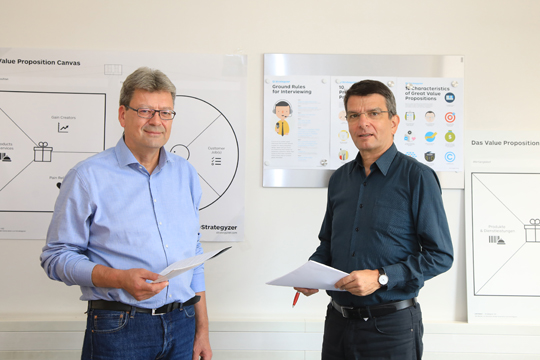Bringing Ideas to Market
Freiburg, Oct 16, 2020
The University of Freiburg realized that it is a boom time for start-ups long ago: since 1999 it has had a start-up office providing advice to staff and students on every aspect of entrepreneurialism. Now, the start-up office has set up two new services for the early and development phases: Dr. Thomas Maier and Dr. Harald Schützeichel have created the ‘Start!’ and ‘Develop!’ programs. Mathias Heybrock talked to both of them.
 Anyone who wants to successfully realize a business concept has to understand the wishes and needs of potential customers and buyers. Photo: Looker Studio/stock.adobe.com
Anyone who wants to successfully realize a business concept has to understand the wishes and needs of potential customers and buyers. Photo: Looker Studio/stock.adobe.com
Dr. Schützeichel, Dr. Maier, why are there now two new programs for the development of business concepts?
Harald Schützeichel: Because of experience we already gained at the start-up office. Some of those who came to us regarded us as a kind of guide, above all: where can we find finance, what funding opportunities and qualifications are there en route to entrepreneurialism? But we’re doing far more than that. We can offer help and advice over an extended period beyond the formation of a company – and we start back at the idea and concept phase. Thomas Maier and I are both entrepreneurs ourselves, alongside our work here – so we know from our own experience what’s important. The new programs now emphasize the aspect of support and advice.
Can you tell us a little about your own companies?
Thomas Maier: I’m a graduate forest scientist and have a company at the interface between forestry and the timber industry.
Harald Schützeichel: I’m a graduate of philosophy and theology and have founded various companies in the German and African solar industry.
Let’s start with the ‘Start!’ program. Who’s it designed for?
Harald Schützeichel: Anyone at the university who has a business idea. It’s fine if it is still only vague. We welcome students, staff, scientists – whatever. We ask them to outline the idea and invite them to an initial meeting that we hold together.
Do you give advice together?
Thomas Maier: We hold the first meeting together, but after that only one of us gives advice and guidance. The idea is that both of us knows about every project that comes to us. And that way we find out which one of us it suits.
What happens then?
Thomas Maier: For ‘Start!’ there are then three more meetings over the course of about six weeks. It shouldn’t last much longer because continuity and keeping going are important when an idea has to be refined.
And then?
Harald Schützeichel: Then the business concept is refined enough to be able to take the next step and test whether it is marketable. This is part of the ‘Develop!’ program, at the end of which there is ideally a viable business model that can be presented to investors. Or you can go on to apply for the national government’s ‘Exist’ program which supports new spin-offs from academia for up to three years with seed capital and advanced business skills.
 Thomas Maier (left) and Harald Schützeichel advise prospective entrepreneurs – it helps that they have experience of running businesses themselves. Photo: Ingeborg F. Lehmann
Thomas Maier (left) and Harald Schützeichel advise prospective entrepreneurs – it helps that they have experience of running businesses themselves. Photo: Ingeborg F. Lehmann
Can you give us an example of a business concept that has gone through this process with you?
Thomas Maier: The two services are still too new for that. However, I can give an example from our past which would have been ideal for this program: Kladde-Verlag had the idea of financing books using crowdfunding – a good and interesting idea, but not one that you will earn a lot of money with. Then they had a second idea: to develop software which could help publishers to evaluate manuscripts. And there is a market for this – so this idea was able to win an ‘Exist’ grant under the name ‘Bookbakers’.
Interesting.
Thomas Maier: So it’s possible to switch between the programs. If ‘Develop!’ reveals that there is no market for the original idea, but there is one for an idea that follows on from it, we can switch back again to ‘Start!’ and begin the process again.
How do you find out if there is a market?
Thomas Maier: With market research, which we encourage our participants to do. Many of them have outlined their ideas to their friends and received feedback, but that isn’t a valid statement about their economic opportunities. They need feedback from potential buyers and customers.
Harald Schützeichel: And you don’t get it by sending an impersonal mass email that no one replies to. You have to make personal contact, present the idea and ask questions: What do you think about that? Could you use it? This is when ideas come face-to-face with the market, with reality. It’s very important.
How many ‘Start!’ participants have you had to tell “This idea is unrealistic.”
Harald Schützeichel: The question is misleading. It isn’t about whether we think an idea is feasible or not. What’s important to us is to enable the founders to decide whether they think an idea is sufficiently viable to create their own company based on it.
Thomas Maier: Once I advised two young men who worked on an app for bus companies. We’d gone a long way, the application for ‘Exist’ was ready and promising. But then the two told me, “The process has made us realize that entrepreneurialism isn’t for either of us.” So they looked for a job. That’s a good result too.
There are other similar programs in the Freiburg region, such as the start-up services from Grünhof or the Baden-Campus. Is there cooperation between you?
Harald Schützeichel: These initiatives are all combined into the ‘Startinsland’ platform, which was established by the start-up office amongst others. We meet regularly, exchange ideas. We’ve got a lot in common – and some differences.
Such as?
Harald Schützeichel: Our programs are less firmly defined. For instance, you can bring an idea to us and get going all year round, not just at a fixed point in time. And maybe we have a little less pressure, we don’t have to fulfill quotas or show how many of the projects we have advised have been launched on the market. This makes us more open to projects that maybe aren’t so commercial, but where there is a demand, a need.
‘Start!’ and ‘Develop!’
University of Freiburg start-up office

